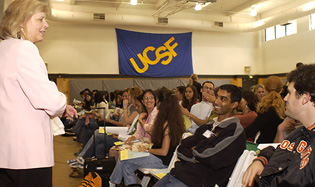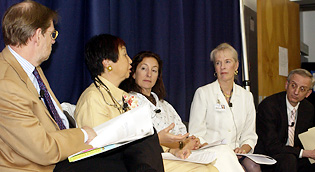
In the first event of its kind, students and deans from all four schools came together recently for an afternoon lesson focusing on patient safety and the importance of teamwork among health care professionals.
The day was designed as a new part of the regular curriculum. Up until now, UCSF has offered few opportunities for students from each school to learn together.
Students from the schools of dentistry, medicine, nursing and pharmacy as well as the physical therapy program participated in the First Annual Interprofessional Education Day on Sept. 20. Deans from all four schools offered words of wisdom at the event.
For his part, Charles Bertolami, DDS, dean of the UCSF School of Dentistry, challenged the students to be true to themselves during their academic experience at UCSF.
"So you're here to fulfill your potential, and that involves change," he said. "But I also would like to suggest that you hold on to some of who you are right now. Change, yes. Improve, yes. But hold on to that something that brought you here in the first place."

Dorrie Fontaine, associate dean of the UCSF School of Nursing, addresses students at the event.
Kathy Dracup, RN, DNSc, dean of the UCSF School of Nursing, shared her experiences from her 40-year nursing career that started off in the intensive care units, which she described as "high-drama places that are suffused with excellent teamwork." That teamwork is learned on the job, she said, rather than in school.
"What I have come to realize as I became dean here is that teamwork is accidental," Dracup said. "We don't help you as you are preparing to be physicians, nurses, physical therapists, dentists, or pharmacists. We don't help you in any way. You can potentially get through four years at this school and this campus and not talk to a person from a different profession. Well, how can we expect you to be at the bedside and effective communicators and know what each other knows and know each other's perception, if we don't do that? So this is just the beginning of what we hope is far more interdisciplinary educational experiences on this campus."
Dracup told the students that those drawn to the health professions want to make a positive difference in people's lives. She voiced her concerns about what she calls a "broken" health care system, encouraging the students to be part of the solution to provide a new model of care.
'Share Our Dream'
"Training places, particularly the hospital, where most of your time will be spent, will be very difficult," Dracup explained. "Unfortunately, hospitals are traditional, they're bureaucratic and they are hierarchical. The regulatory burden has just grown exponentially over the last decade. All of these factors erode patient safety and they also erode career satisfaction in each of you. I think the antidote to that is interdisciplinary teamwork and collaboration. But that antidote depends on you all not taking on stereotypes -- being willing at times to be followers and at times to be leaders no matter what it says on your name badge.
"At the end of the day, we're really asking you this afternoon to share our dream. It's a dream where patients are at the center of care, family members are included, and interdisciplinary and interprofessional collaboration is the norm, not the exception."

From left, deans David Kessler, Mary Anne Koda-Kimble, nursing student Aubrey Wade, Kathy Dracup and Charles Bertolami discuss issues raised in a skit during the First Annual Interprofessional Education Day.
The day was a product of three years of work by a committee of faculty, staff and students, led by Dorrie Fontaine, RN, DNSc, associate dean of the UCSF School of Nursing. Fontaine noted that when she got together with associate deans from the other schools to discuss interprofessional education, it was the first time that they had met.
To emphasize the point of teamwork among health care professionals, the event featured a skit with the deans and nursing student Aubrey Wade each playing a part. The skit depicted a real-life scenario of a UCSF patient who developed a hematoma on her neck after undergoing surgery to remove a cancerous thyroid gland. The outcome did not go well.
Students discussed the issues raised in the skit during several breaks - learning from the mistakes. They also heard from medical errors expert Robert Wachter, MD, professor and associate chair of medicine, who shared his insight about the state of health care today. Each student received a free copy of the book
Internal Bleeding, which Wachter co-wrote.
Wachter said while the United States works to find the remedy to better prevent medical mistakes, he believes improved human interaction among patients, family members and practitioners will make the difference.
"I think we can fix this," Wachter said. "I don't think we'll ever prevent all errors in medicine or dentistry... We're never going to bring the error rate to zero. But I think we can cut it by 70 or 80 percent, and some of that is going to be computers and checklists, but a lot of that is going to be you teaching us what a different style of interacting with each other is."
Photos/Christine Jegan
Related Links:
Medical Errors Expert Among Top 50 Most Influential Doctors


